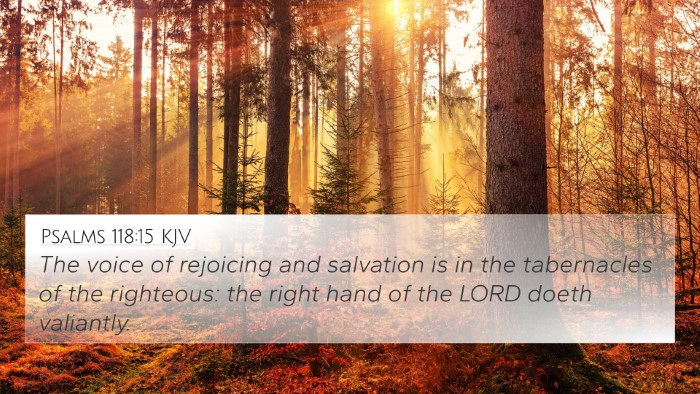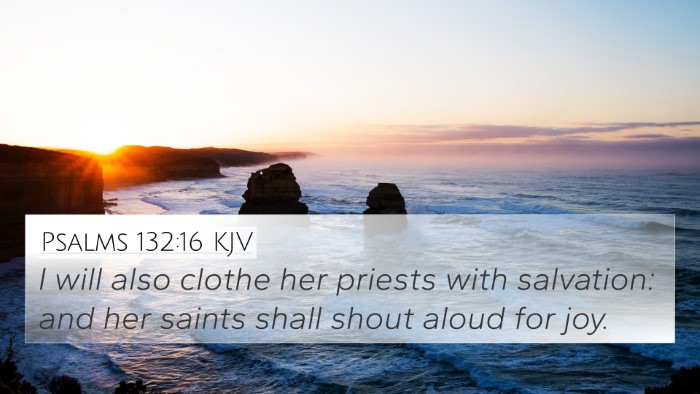Understanding Psalms 149:5
Psalms 149:5 states, "Let the saints be joyful in glory: let them sing aloud upon their beds." This verse invites an exploration of joy and praise among the faithful.
Verse Meaning and Interpretation
Psalms 149 concludes the final book of the Psalms with an emphasis on the joy of the Lord's people. Matthew Henry emphasizes that this joy is founded upon the glory and victory of God's people, as they are assured of His presence and favor.
Albert Barnes adds that the exhortation to sing aloud signifies a profound internal joy expressed externally. This highlights the relationship between the inner spiritual state and outward expression, noting that even in the secure privacy of their beds, the saints engage in worship.
Adam Clarke suggests that this joyful expression is not confined to communal worship but also reflects a personal relationship with God. He points out how the verse evokes a sense of comfort and peace that believers can experience at any moment, including the quietness of their homes.
Theological Insights
The concept of joy in Psalms 149:5 promotes an understanding that worship transcends physical places and formal gatherings. Instead, it is a continual act of reverence and celebration found in every aspect of life.
Some key theological insights draw from the implications of this verse:
- Joy as a characteristic of faith.
- The connection between personal devotion and communal worship.
- Expressing gratitude regardless of circumstances.
Cross-References to Psalms 149:5
This verse has several Biblical cross-references that enhance its meaning and contextual understanding:
- Philippians 4:4 - "Rejoice in the Lord always: and again I say, Rejoice." This echoes the call for continuous joy in the Lord.
- James 5:13 - "Is any among you afflicted? let him pray. Is any merry? let him sing psalms." This verse highlights the connection between joy and worship through singing.
- Psalm 30:5 - "Weeping may endure for a night, but joy comes in the morning." This reinforces the idea of joy arising from God’s grace.
- Psalm 100:1-2 - "Make a joyful noise unto the Lord, all ye lands. Serve the Lord with gladness; come before his presence with singing." This connects public joy with private worship.
- 1 Thessalonians 5:16 - "Rejoice evermore." This passage encourages a lifestyle of continual rejoice, resonating with the themes of Psalms 149.
- Colossians 3:16 - "Let the word of Christ dwell in you richly; in all wisdom; teaching and admonishing one another in psalms and hymns and spiritual songs." This relates to singing and praises among the saints.
- Isaiah 61:10 - "I will greatly rejoice in the Lord, my soul shall be joyful in my God." The theme of rejoicing in God's joy can be linked across the scriptures.
- Romans 15:13 - "Now the God of hope fill you with all joy and peace in believing." This highlights the foundational aspect of joy in faith.
- Nehemiah 8:10 - "For the joy of the Lord is your strength." This provides the basis for understanding joy as a source of spiritual strength.
- Psalm 118:24 - "This is the day which the Lord hath made; we will rejoice and be glad in it." This reflects the commitment to joyfulness as a response to God's daily blessings.
Tools for Bible Cross-Referencing
To expand your understanding of Psalms 149:5, consider utilizing various tools for Bible cross-referencing:
- Bible concordance - Essential for finding specific verses connected by themes or keywords.
- Bible cross-reference guide - This can help you understand the parallels between different verses.
- Cross-reference Bible study - Engaging in this type of study allows for deeper exploration of the interconnectedness of scripture.
- Bible reference resources - These can provide insights and context related to specific passages.
Conclusion
In summary, Psalms 149:5 encapsulates the essence of joy and worship both privately and publicly. The interconnections as illustrated through various cross-references enrich our understanding and highlight the broader theological implications of joy in the life of a believer. By utilizing effective tools for Bible cross-referencing and engaging with other relevant scriptures, one can cultivate a more profound relationship with God through praise and celebration.
Further Study Recommendations
If you're eager to learn more about Biblical joy and its implications across scripture, consider exploring:
- Connections between Old and New Testament teachings on worship.
- Comparative studies of the expressions of joy in the Gospels.
- Inter-Biblical dialogues between the Psalms and New Testament writings.












